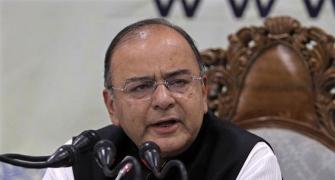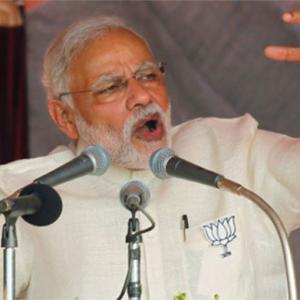Against estimates of black wealth of Rs 300 lakh crore and black money in cash of Rs 3 lakh crore by economist Arun Kumar, the PMGKY numbers fall short by a huge margin.

On a November evening last year, bang in the middle of his five-year term, Prime Minister Narendra Modi addressed the nation, announcing that Rs 500 and Rs 1,000 notes would be taken out of circulation.
In his speech on November 8, Modi said, “To break the grip of corruption and black money, we have decided that the five hundred rupee and thousand rupee currency notes presently in use will no longer be legal tender from midnight.”
In subsequent public speeches in those initial heady days after the note ban announcement there were suggestions and expectations that the move could bring enough black money into government coffers to fulfill Modi’s election promise of depositing Rs 15 lakh in the bank account of every Indian.
But ingenious minds had other ideas and some people turned to Modi’s own schemes like Jan Dhan to sidestep the note ban. Six months from that big decision, the government and the central bank are yet to disclose the amount of banned notes that were deposited in the banks.
The Pradhan Mantri Garib Kalyan Yojana (PMGKY), an income-disclosure scheme, which opened on December 17, 2016, provided the last chance to holders of undisclosed income to come clean by paying tax and penalty.
The scheme entailed a payment of 49.9 per cent tax, surcharge and penalty, and a mandatory deposit of 25 per cent of the black money in a interest-free account for four years.
The scheme, which was expected to lead to disclosures in the lakh of crores of rupees, ended up seeing declarations of just Rs 4,600 crore till the deadline of March 31. The scheme was later extended to May 10.
Against estimates of black wealth of Rs 300 lakh crore and black money in cash of Rs 3 lakh crore by economist Arun Kumar, the PMGKY numbers fall short by a huge margin.
However, the note ban has had its benefits. There has been a 15 per cent jump in advance tax and a 24 per cent rise in self-assessment tax collections for 2016-17, the highest growth rate in at least five years, suggesting many people regularised their unaccounted income by recording it in the books.
Another statistic that helps bolster the argument is the remarkable rise in the number of assesses. Finance Minister Arun Jaitley said the note ban had helped the authorities bring 9.1 million people into the tax net.
This is roughly one-fourth of 37 million individuals who filed tax returns in 2015-16.
Numbers such as these and the intent displayed by the government are inspiring confidence among experts about the rooting out of black money. Riaz Thingna, director, Grant Thornton Advisory said, “Amongst the various steps taken by the government since coming into power, demonetisation has been the biggest of the big-bang reforms.”
Corruption and black money were two crucial planks of Modi’s election campaign that led to the Bharatiya Janata Party’s victory in the 2014 general elections.
It came as no surprise when the government’s first Cabinet decision was to set up a special investigative team (SIT) to unearth black money, headed by retired Supreme Court judge MB Shah. Since then, the SIT has made several recommendations to the government.
Besides PMGKY, the government has come out with two other schemes aimed to bring in undisclosed money. The Black Money Act, to bring in undisclosed foreign income and assets in 2015, saw declarations of Rs 4,164 crore (Rs 41.64 billion), while another Rs 55,000 crore (Rs 550 billion) were declared under the Income Declaration Scheme, 2016, where the tax and penalty worked out to 45 per cent.
Several other steps taken over the three years, such as the passing of the benami transaction law, reforms in political donations, crackdown on shell companies and the limitations on cash transactions might help push generators of black money into a corner in the long run, feel experts.
Amarpal Chadha, tax partner and India mobility leader, EY said, “Participating proactively in efforts to combat domestic tax evasion/black money by the demonetisation exercise and subsequent disclosure opportunities is passing on a strong message.”
Chadha also refers to the initiation of Operation Clean Money, the initial phase of which involves e-verification of large cash deposits, for which data analytics is being used. “All these steps form the basis for creating a positive tax environment and increase the confidence of tax-compliant citizens.”
In the second phase of Operation Clean Money, the income tax department has zeroed in on 60,000 persons who deposited “excessive” cash after the note ban, with 1,300 being high-risk. These include those dealing in high-value properties and those sending money abroad.
Central Board of Direct Taxes Chairman Sushil Chandra had told Business Standard in an earlier interaction: “Under the second phase, we have outlined three options to identify tax evaders.
First, we will conduct a deeper scrutiny of the individuals identified. Second, we may launch an open enquiry if we receive more information, apart from the data compiled. Third, in case of strong evidence, we will undertake enforcement action and book the individuals on the spot.”
While central agencies are leaving no stone unturned to bring back willful loan defaulters, some of whom have fled the country after siphoning funds, other usual suspects have been searched.
On bringing back billions of dollars of black money suspected to be stashed abroad, the government is also engaging with other countries for exchange of information under double taxation avoidance and tax information exchange agreements.
“The next steps which the government will take, using the information on non-compliance gathered through various measures, will help increase the number of taxpayers in India,” added Chadha.
With both laws and intention in place, the government has two more years to work on bringing black money hoarders to book.
Photograph: Rupak De Chowdhuri/Reuters










